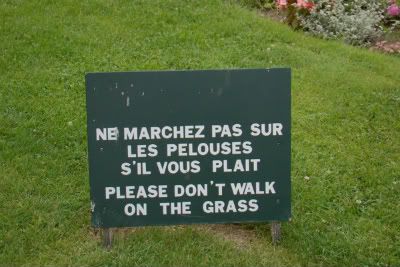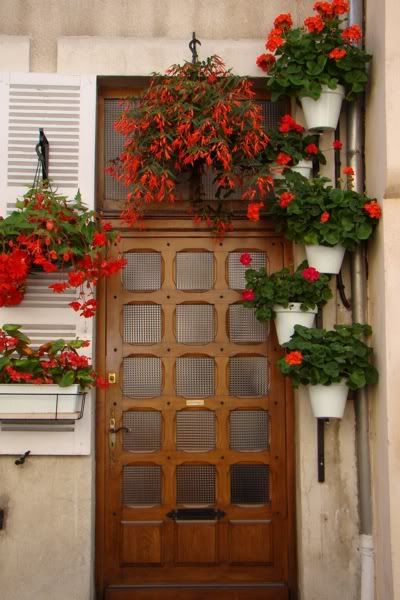The French are serious about not walking on the grass, ever
As much as I like France, I’m not a fan of their gardening philosophy of everything manicured within an inch of their lives, “keep off the grass” signs everywhere, everything for show – all order and balance. They don’t invite me to take off my shoes, wiggle my toes, and set a spell. They frequently treat the outdoors as an objet d’art rather than a place to relax and express myself.
I’m more a Gertrude Jekyll kind of gardener. I like my Russian sage intertwining with my daylilies and my grape hyacinths and daffodils coming up anywhere they please. I have a certain set of borders they stay behind and I have to watch for the tipping point when one plant might take advantage of the space of a less aggressive one, and I like a general color scheme, e.g. pastels with a well-placed bright red or purple adding a bit of spice – or even the opposite with hot colors and the pastels to soften.
I’m more a Gertrude Jekyll kind of gardener. I like my Russian sage intertwining with my daylilies and my grape hyacinths and daffodils coming up anywhere they please. I have a certain set of borders they stay behind and I have to watch for the tipping point when one plant might take advantage of the space of a less aggressive one, and I like a general color scheme, e.g. pastels with a well-placed bright red or purple adding a bit of spice – or even the opposite with hot colors and the pastels to soften.
Chateaux gardens rarely tempt me to come closer than this
While a French formal garden can sedate me, the controlled chaos of a Jekyll cottage garden excites me to new possibilities. When I see a patch of golden coreopsis thriving in an unexpected place, instead of ripping it out because that’s not where it was supposed to be, I immediately want to figure out what else I can plant there to show off all the blooms in their best light. That’s how I like the country I live in, too. I love a mélange, a mix of cultures. It’s possible to embrace the world without leaving the borders of the United States.
Last week I was in Sparta, GA (more about that in a later post) and found, even that deep in the South, Main Street had a Chinese take-out restaurant next to a BBQ rib joint. Yet this has been a week that has caused me to shake my head at so many instances making me feel this country is putting up more “pelouse interdite” signs.
First, during a March Madness game spectators shouted out “Where’s your green card?” to a Puerto Rican player on the free-throw line. Aside from just being rude, it also showed a distinct ignorance. Quick, can anyone tell me why you don’t need a passport to take your spring break in Puerto Rico? It’s a commonwealth country of the United States (bonus points if you can name the other commonwealths and territories, in other words colonies, of the U.S.*). But even if the player were an immigrant from Zimbabwe, why would it be a source for taunting?
Last week I was in Sparta, GA (more about that in a later post) and found, even that deep in the South, Main Street had a Chinese take-out restaurant next to a BBQ rib joint. Yet this has been a week that has caused me to shake my head at so many instances making me feel this country is putting up more “pelouse interdite” signs.
First, during a March Madness game spectators shouted out “Where’s your green card?” to a Puerto Rican player on the free-throw line. Aside from just being rude, it also showed a distinct ignorance. Quick, can anyone tell me why you don’t need a passport to take your spring break in Puerto Rico? It’s a commonwealth country of the United States (bonus points if you can name the other commonwealths and territories, in other words colonies, of the U.S.*). But even if the player were an immigrant from Zimbabwe, why would it be a source for taunting?
At least they said "please" this time
These spectators could have gotten the idea from Republican primary candidate Rick Santorum, who showed his own lack of knowledge regarding American history and law in an interview with a Puerto Rican journalist. His demand that all citizens of that country learn English before it could become a full-fledged US state ignored the fact that there is no federal law that mandates English as the national language. (And the fact that he uses a quotation in Latin to support his English-only argument? Well, I won’t even go there or my rant could last for pages and pages.)
The absence of a federal law doesn’t stop many states – including my own – from trying to pass as many language and citizen litmus laws as possible. My state legislature wants driver’s license tests to be available only in English. The State Highway Patrol, by the way, is against this for many reasons, not the least of which is that they think the roads are safer if everyone knows the rules and has a proper driver’s license, even if the agency has to make language accommodations for the test. Clearly the people who made this law are not the sort of people who would ever find themselves being offered a job in a foreign country (like France, par example) where driver’s tests are given in only one language and it isn’t yours. They have not felt the sting of discrimination.
Is America really becoming a “keep off the grass” kind of country?
As a traveler I want to experience the world, but I want the world to be kind to me and welcome me. I don’t expect them to bend over backward to accommodate me every step of the way or completely alter their culture to make it more to my liking (although it would be nice if France had a bit more ethnic food offerings in the grocery store than El Paso taco shells and sauce, and had free refills on soda at restaurants, and offered more than two ice cubes per glass). For the most part, I only want to feel human warmth. I want to feel accepted and not like a “weed” that blights their garden.
So when you head out to your yard to do some spring pruning and head to your local gardening shop to pick up some flats of pansies, imagine how dull it would look if all it had were boxwoods lined up in perfect formation.
The absence of a federal law doesn’t stop many states – including my own – from trying to pass as many language and citizen litmus laws as possible. My state legislature wants driver’s license tests to be available only in English. The State Highway Patrol, by the way, is against this for many reasons, not the least of which is that they think the roads are safer if everyone knows the rules and has a proper driver’s license, even if the agency has to make language accommodations for the test. Clearly the people who made this law are not the sort of people who would ever find themselves being offered a job in a foreign country (like France, par example) where driver’s tests are given in only one language and it isn’t yours. They have not felt the sting of discrimination.
Is America really becoming a “keep off the grass” kind of country?
As a traveler I want to experience the world, but I want the world to be kind to me and welcome me. I don’t expect them to bend over backward to accommodate me every step of the way or completely alter their culture to make it more to my liking (although it would be nice if France had a bit more ethnic food offerings in the grocery store than El Paso taco shells and sauce, and had free refills on soda at restaurants, and offered more than two ice cubes per glass). For the most part, I only want to feel human warmth. I want to feel accepted and not like a “weed” that blights their garden.
So when you head out to your yard to do some spring pruning and head to your local gardening shop to pick up some flats of pansies, imagine how dull it would look if all it had were boxwoods lined up in perfect formation.
(*If you want to learn more about U.S. “colonies,” go here.)
What will your garden look like this spring? Are you a formal garden kind of person or more the cottage garden kind? Have you ever been made to feel like a “weed” in a place to which you traveled? Share all your gardening and traveling tales in the comments box.
The redeeming French gardening habit -- an obsession with red geraniums








![Grace [Eventually]: Thoughts on Faith](http://photo.goodreads.com/books/1166504427s/12542.jpg)









12 comments:
I couldn't agree with you more! What kind of place are we inhabiting if shouts like the one you heard at the basketball game are tolerated?
I very much felt like an univited "weed" when travelling in Rome last summer. Wait staff at most restaurants were just rude. I could chalk it up to "that's just how Americans get treated in Rome" but it stung nonetheless, especially since my friend and I had gone out of our way to really try to speak the language and honor local customs. The storekeepers were even worse. Needless to say, by the end of our stay we were not wanting to eat out much and we didn't do much shopping at all. Our b & b host was fabulous as were most people we encountered at museums and other sights. Too bad because there's so much to love about Rome.
It pains me to hear of Americans treating those from other countries in this manner. Being treated as a pariah in Rome definitely altered my view on the city.
Hi Tami. I saw your 7 post and will respond this week. But I've heard about Italian restaurants and their attitude toward tourists. Can't remember the source, but I remember learning somewhere about one menu and set of prices for locals and one for tourists. I guess the trick might be to go where tourists never go (i.e., not Rome).
I guess I'm seeing this from a couple different sides. If you're just coming for a visit, want to see the Grand Canyon or experience the American culture -- then I have no problem with you staying within your own language/culture while you are here. But, if you plan to stay and make this your home -- then our language and culture need to become yours. If you are happy with your own culture/language, then why move here?
In my travels around America, I've also noted some huge differences in culture. In the south, everyone talks to everyone, it's friendly, inviting. In the north, not so much. But it's not that northerners are trying to be ruse -- they just do't see any point in sharing their lives with people they don't know. Even otherwise innocuous comments (like How are you?) can seem invasive in some parts of America and compassionate in others.
Your garden analogies were woven in so beautifully with your ideas. I prefer the cottage type of gardening and freedoms--unfettered, allowing new species to sprout at will. I only pull out the weeds that interfere with the growth of other plants. Weeds are a big part of my spring garden, where they spring up and yield a profusion of yellow along with my daffodils and crocus. Don't weeds add some nutrients to the soil?
Yes, Cora, weeds can add nutrients as they die and decompose in the winter. But right now, with our spring rain, they're choking out the flowers trying to bloom. *snarl*
Carrie, you're right that if we move to another country we need to adapt to where we are. To some extent. For example, in France I lower my volume when speaking from an American 8 to a French 2. But I will never agree to their history of going on strike over the least little thing. I do try to speak French, but it is extremely difficult to master a language beyond "tourist-speak" if you don't begin learning it until you're an adult. I know I'd never learn French well enough to understand any legal papers I was signing or to sit in a class taught only in French -- or take their driver's test, which scares even the natives for its complexity.
Always love a good garden post, especially one that links gardening to the rest of life!
I'm definitely not the French kind of gardener. I call my style Texas Big Hair, though now that I've relocated to Washington State I'll call it an homage to Cougar Annie of Vancouver Island. In other words, I like lots of chaos -- uncontrolled, please! (though I loved the Gertrude Jekyll pics)
As someone who has stumbled along with studying languages, I have a great deal of sympathy for people who have difficulty coming here and learning English. I wonder how many people who criticize immigrants have actually tried to learn a foreign language!
When traveling, I find most people to be friendly. I can't tell you how many times complete strangers come up to us in an unfamiliar country as we look at a map and help us find our way. I've chatted politics on the Paris Metro and been invited to private homes in Costa Rica for dinner. We've shared jokes and laughter on an Israeli street corner.
We've had the occasional rude waiter, but I get those here in the good ol' US of A, too. I think the whole world is a gorgeous, chaotic garden of people and cultures of all types!
This topic is too close to home. I’m an immigrant. I came from Russia and made Canada my home almost 20 years ago. I learned the language to a degree where I can write professionally in English (and get paid for it). But every time I open my mouth and my accent comes out, people say kindly: “Oh, your English is very good.” They think they compliment me, but the comment drives me crazy. Of course my English is good. I’m a professional writer, for crying out loud. But whenever I say that, it is often met with a question: “Do you write in English?” That’s another sentiment that makes me want to throw a tantrum. Recently, I stopped telling people I’m a writer just to avoid this question, but the reality remains. Immigrants are different, no matter how hard they try to blend in. And the same reality prevented me from finding a job as a writer. Nobody wants their technical writer or communication officer to speak with an accent. Everyone expects grammatical mistakes from us. Unfortunately, 99 times out of 100 they are correct. But in my case, it rankles.
I understand what you're saying, Olga. I can read every language I've studied. I haven't pressed myself to producing writing in them. Maybe I should work on that more. But I just can't pronounce them well. I know I would always be taken for a foreigner. But I do like the challenge of trying.
Great analogy, and thought-provoking post. Thanks so much.
Wow, I had no idea the French were so persnickety about their greenery.But you raise valid points about our culture and I agree with Cora, you analogies are perfect.
I've visited many US places that now don't allow walking on the grass. One thing I do love about the French is their obsession with geraniums because I love geraniums.
I can't even count, Donna, how many geranium pictures I've taken.
Post a Comment